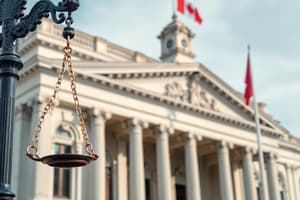Podcast
Questions and Answers
What is the primary jurisdiction of the Tax Court of Canada?
What is the primary jurisdiction of the Tax Court of Canada?
- Income tax appeals (correct)
- Criminal cases
- Family law
- Civil appeals
The Supreme Court is appointed by the provincial governments.
The Supreme Court is appointed by the provincial governments.
False (B)
How many judges does the Supreme Court of Canada comprise?
How many judges does the Supreme Court of Canada comprise?
Nine
The ________ courts handle crime and offences, small claims, youth, and traffic in Saskatchewan.
The ________ courts handle crime and offences, small claims, youth, and traffic in Saskatchewan.
Match the following courts to their functions:
Match the following courts to their functions:
Which section of the Constitution Act 1867 outlines the federal government's powers regarding criminal law?
Which section of the Constitution Act 1867 outlines the federal government's powers regarding criminal law?
Provincial Courts have authority over provincial laws and administration of justice.
Provincial Courts have authority over provincial laws and administration of justice.
What role does the Parliament of Canada have regarding the judges' salaries?
What role does the Parliament of Canada have regarding the judges' salaries?
Who has the authority to appoint judges in Canada?
Who has the authority to appoint judges in Canada?
To qualify as a judge, a person must have at least 10 years of experience at the bar in any province.
To qualify as a judge, a person must have at least 10 years of experience at the bar in any province.
What is the minimum tenure required for a judge from Quebec to be appointed?
What is the minimum tenure required for a judge from Quebec to be appointed?
Judges must be appointed by the _____ in Council.
Judges must be appointed by the _____ in Council.
Match the following concepts with their descriptions:
Match the following concepts with their descriptions:
What is a core issue with all judiciaries?
What is a core issue with all judiciaries?
Quebec judges can be seen as partisan in disputes involving their province.
Quebec judges can be seen as partisan in disputes involving their province.
What is one source of legitimacy for a judiciary?
What is one source of legitimacy for a judiciary?
What problem is associated with majoritarianism in legislative actions?
What problem is associated with majoritarianism in legislative actions?
The role of defining rights should be left solely to judicial bodies.
The role of defining rights should be left solely to judicial bodies.
What is the main argument against an unelected judiciary's ability to overturn decisions made by elected legislators?
What is the main argument against an unelected judiciary's ability to overturn decisions made by elected legislators?
Under _____ form judicial review, judicial decisions are binding on legislators.
Under _____ form judicial review, judicial decisions are binding on legislators.
Match the following terms with their definitions:
Match the following terms with their definitions:
Under the BNA Act, which form of judicial review allows the judiciary to invalidate legislation?
Under the BNA Act, which form of judicial review allows the judiciary to invalidate legislation?
In Canada's constitutional framework, legislation can be amended to align with the Bill of Rights easily.
In Canada's constitutional framework, legislation can be amended to align with the Bill of Rights easily.
According to the supremacy clause s52, the constitution of Canada is the _____ law of Canada.
According to the supremacy clause s52, the constitution of Canada is the _____ law of Canada.
What does the governor in council do regarding important legal questions?
What does the governor in council do regarding important legal questions?
The advisory opinions given by the Supreme Court of Canada are always binding.
The advisory opinions given by the Supreme Court of Canada are always binding.
What must the court do when a reference is made by the governor in council?
What must the court do when a reference is made by the governor in council?
According to the legal convention, the SCC cannot contradict their own _____ for future litigation.
According to the legal convention, the SCC cannot contradict their own _____ for future litigation.
Match the following descriptions to their correct term:
Match the following descriptions to their correct term:
What is the role of the Cabinet in relation to the Supreme Court of Canada?
What is the role of the Cabinet in relation to the Supreme Court of Canada?
An appeal lies to the Court from an opinion pronounced by the highest court of final resort in a province.
An appeal lies to the Court from an opinion pronounced by the highest court of final resort in a province.
Democracy is characterized as the rule of the _____ .
Democracy is characterized as the rule of the _____ .
What is the purpose of the Notwithstanding Clause (s33) in the Charter of Rights and Freedoms?
What is the purpose of the Notwithstanding Clause (s33) in the Charter of Rights and Freedoms?
The Charter of Rights and Freedoms binds only the federal government.
The Charter of Rights and Freedoms binds only the federal government.
What is the rule for amending the Constitution of Canada as per the Charter?
What is the rule for amending the Constitution of Canada as per the Charter?
The supremacy clause offers a textual basis for ________ form judicial review.
The supremacy clause offers a textual basis for ________ form judicial review.
Match the following aspects of the Charter with their descriptions:
Match the following aspects of the Charter with their descriptions:
What is a characteristic of the statutory bill of rights?
What is a characteristic of the statutory bill of rights?
Judicial interpretation reflects a juristocracy where judges have perceived authority over legislative bodies.
Judicial interpretation reflects a juristocracy where judges have perceived authority over legislative bodies.
What happens to a declaration made under s33 after five years?
What happens to a declaration made under s33 after five years?
Which of the following rights is considered 'without reach'?
Which of the following rights is considered 'without reach'?
Bill 21 pertains to the religious neutrality of the state in Quebec.
Bill 21 pertains to the religious neutrality of the state in Quebec.
What was the primary purpose of the pre-emptive use of NWC?
What was the primary purpose of the pre-emptive use of NWC?
The right to not be arbitrarily ______ or imprisoned is a fundamental human right.
The right to not be arbitrarily ______ or imprisoned is a fundamental human right.
Match the provinces with their respective issues:
Match the provinces with their respective issues:
Which of the following statements about NWC is correct?
Which of the following statements about NWC is correct?
The use of NWC has been historically limited to the years between 1982 and 2015.
The use of NWC has been historically limited to the years between 1982 and 2015.
What did the CAQ government justify regarding Bill 21?
What did the CAQ government justify regarding Bill 21?
Flashcards
Bijuralism
Bijuralism
A court system with the authority to hear cases related to both civil and common law, reflecting the legal traditions of Canada.
Division of Powers
Division of Powers
The division of powers between the federal and provincial governments in Canada, as outlined in the Constitution Act, 1867.
S92(14)
S92(14)
A section of the Constitution Act, 1867, that outlines the provincial government's power to administer justice within its province, including establishing courts.
S101
S101
Signup and view all the flashcards
Supreme Court of Canada
Supreme Court of Canada
Signup and view all the flashcards
Provincial Superior Trial Court
Provincial Superior Trial Court
Signup and view all the flashcards
Federal Courts
Federal Courts
Signup and view all the flashcards
Tax Court of Canada
Tax Court of Canada
Signup and view all the flashcards
Institutional Legitimacy
Institutional Legitimacy
Signup and view all the flashcards
Complicating Law/Representativeness
Complicating Law/Representativeness
Signup and view all the flashcards
Reference Jurisdiction
Reference Jurisdiction
Signup and view all the flashcards
Governor in Council's Reference Power
Governor in Council's Reference Power
Signup and view all the flashcards
Probability of Compliance
Probability of Compliance
Signup and view all the flashcards
Coercion
Coercion
Signup and view all the flashcards
Quebec Judge Quota
Quebec Judge Quota
Signup and view all the flashcards
Institutional Strategic Concern
Institutional Strategic Concern
Signup and view all the flashcards
Majoritarianism
Majoritarianism
Signup and view all the flashcards
Legislative Role in Defining Rights
Legislative Role in Defining Rights
Signup and view all the flashcards
Majoritarian Tyranny
Majoritarian Tyranny
Signup and view all the flashcards
Democracy as a Limit on State Power
Democracy as a Limit on State Power
Signup and view all the flashcards
Judicial Review
Judicial Review
Signup and view all the flashcards
Counter-Majoritarian Difficulty
Counter-Majoritarian Difficulty
Signup and view all the flashcards
Weak Form Judicial Review
Weak Form Judicial Review
Signup and view all the flashcards
Strong Form Judicial Review
Strong Form Judicial Review
Signup and view all the flashcards
References to the SCC
References to the SCC
Signup and view all the flashcards
SCC's Duty in References
SCC's Duty in References
Signup and view all the flashcards
Provincial References
Provincial References
Signup and view all the flashcards
Advisory Opinions
Advisory Opinions
Signup and view all the flashcards
Non-Binding Nature of Advisory Opinions
Non-Binding Nature of Advisory Opinions
Signup and view all the flashcards
Precedence of Advisory Opinions
Precedence of Advisory Opinions
Signup and view all the flashcards
SCC's Consistency in Advisory Opinions
SCC's Consistency in Advisory Opinions
Signup and view all the flashcards
Unofficial Binding Nature of Advisory Opinions
Unofficial Binding Nature of Advisory Opinions
Signup and view all the flashcards
Disallowance Power
Disallowance Power
Signup and view all the flashcards
Federal Disallowance Power
Federal Disallowance Power
Signup and view all the flashcards
Notwithstanding Clause (NWC)
Notwithstanding Clause (NWC)
Signup and view all the flashcards
Pre-emptive Use of NWC
Pre-emptive Use of NWC
Signup and view all the flashcards
Quebec and the NWC
Quebec and the NWC
Signup and view all the flashcards
Bill 21 (Laïcité)
Bill 21 (Laïcité)
Signup and view all the flashcards
Omnibus Use of NWC
Omnibus Use of NWC
Signup and view all the flashcards
Patriation and the NWC
Patriation and the NWC
Signup and view all the flashcards
Supremacy Clause
Supremacy Clause
Signup and view all the flashcards
Charter's Place in the Constitution
Charter's Place in the Constitution
Signup and view all the flashcards
Judicial Interpretation of Rights
Judicial Interpretation of Rights
Signup and view all the flashcards
Default Judicial Review
Default Judicial Review
Signup and view all the flashcards
Entrenched Bill of Rights
Entrenched Bill of Rights
Signup and view all the flashcards
Notwithstanding Clause (s. 33)
Notwithstanding Clause (s. 33)
Signup and view all the flashcards
Time Limit and Re-enactment
Time Limit and Re-enactment
Signup and view all the flashcards
Statutory Bill of Rights
Statutory Bill of Rights
Signup and view all the flashcards
Study Notes
Provincial Courts
- Provincial courts administer justice, including procedures for civil matters within their province.
- Provincial courts possess inherent general jurisdiction and follow federal and provincial laws.
- Criminal law, with the exception of court constitution aspects, falls under provincial jurisdiction, but procedure in criminal matters is a provincial court responsibility.
- Provincial criminal procedure is uniform across the country.
Federal Courts
- The Governor-General appoints judges for superior, district and county courts (excluding those in NS and NB).
- Salaries, allowances, and pensions of these judges are paid by the Parliament.
- Federal courts are responsible for Canadian laws.
- Default cases are heard in provincial courts.
- Specialized courts are established for cases like tax appeals (e.g., Canadian tax court).
Supreme Court
- The Supreme Court is appointed by the Governor-General and advised by the Prime Minister.
- There's no constitutionalized role for provincial courts in the Supreme Court.
- A minimum of three Quebec (QC) judges are required.
- Territorial representation for judges is regulated.
- The court has a system to balance civil and common law traditions.
Judges
- Federal Courts: A chief justice and 8 puisne judges are required
- Appointment is by the Governor General, in council by Letters Patent
- Judges must be either current or former judges of a prior province court
- Judges must have a minimum recognized standing in the court.
- Judges are appointed from among advocates of the Province of Quebec.
Judicial Review
- The Supreme Court handles appeals of cases coming from provincial courts and acts as the highest court.
- Certain cases may be referred to the Supreme Court, involving matters of significance.
- Parliament defines the Court's jurisdiction, and this power is based on the power of reference.
- The Supreme Court has the power to interpret the constitution in cases of conflicting legislation.
Studying That Suits You
Use AI to generate personalized quizzes and flashcards to suit your learning preferences.




